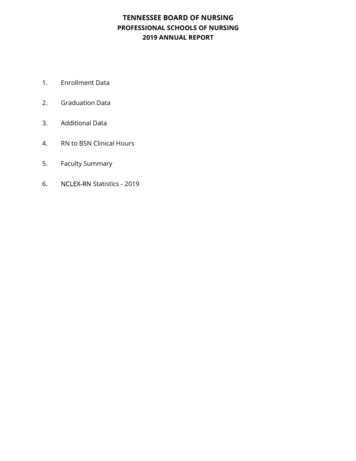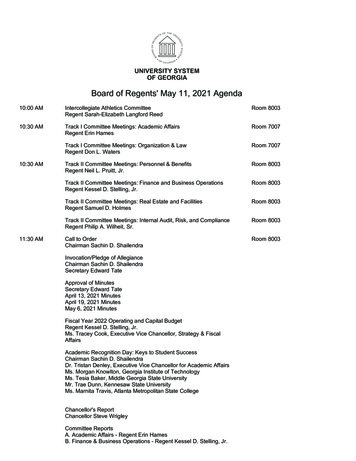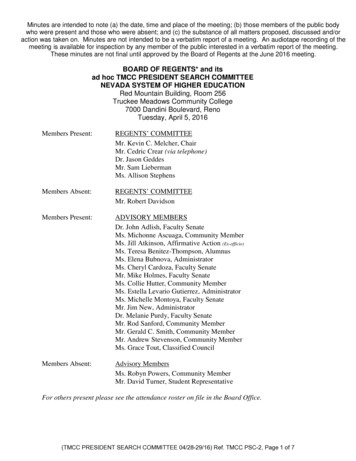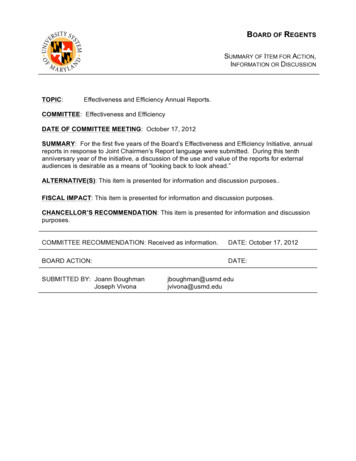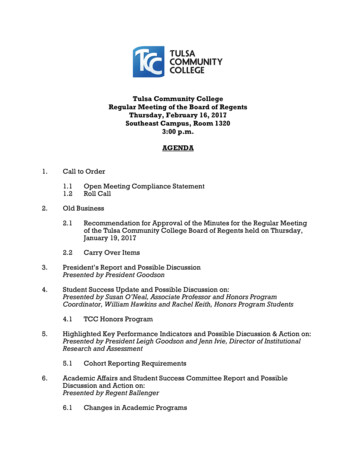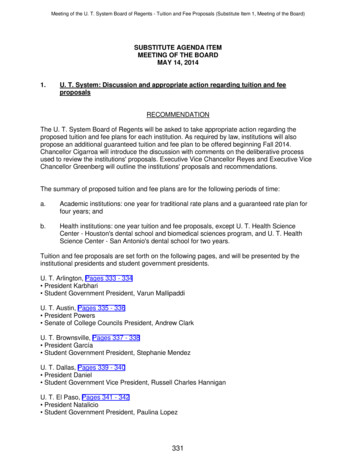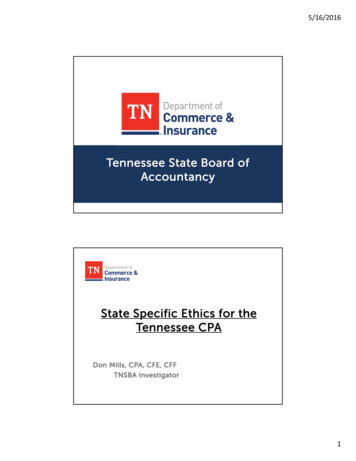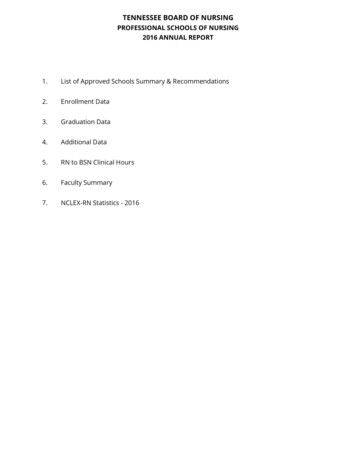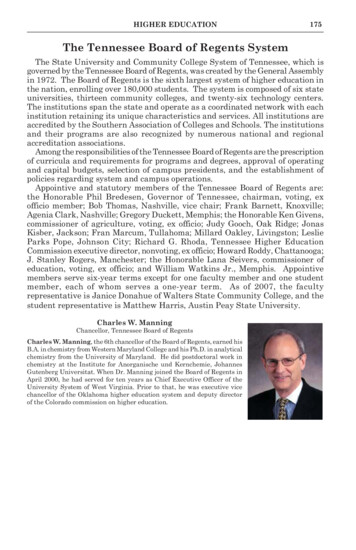
Transcription
HIGHER EDUCATION175The Tennessee Board of Regents SystemThe State University and Community College System of Tennessee, which isgoverned by the Tennessee Board of Regents, was created by the General Assemblyin 1972. The Board of Regents is the sixth largest system of higher education inthe nation, enrolling over 180,000 students. The system is composed of six stateuniversities, thirteen community colleges, and twenty-six technology centers.The institutions span the state and operate as a coordinated network with eachinstitution retaining its unique characteristics and services. All institutions areaccredited by the Southern Association of Colleges and Schools. The institutionsand their programs are also recognized by numerous national and regionalaccreditation associations.Among the responsibilities of the Tennessee Board of Regents are the prescriptionof curricula and requirements for programs and degrees, approval of operatingand capital budgets, selection of campus presidents, and the establishment ofpolicies regarding system and campus operations.Appointive and statutory members of the Tennessee Board of Regents are:the Honorable Phil Bredesen, Governor of Tennessee, chairman, voting, exofficio member; Bob Thomas, Nashville, vice chair; Frank Barnett, Knoxville;Agenia Clark, Nashville; Gregory Duckett, Memphis; the Honorable Ken Givens,commissioner of agriculture, voting, ex officio; Judy Gooch, Oak Ridge; JonasKisber, Jackson; Fran Marcum, Tullahoma; Millard Oakley, Livingston; LeslieParks Pope, Johnson City; Richard G. Rhoda, Tennessee Higher EducationCommission executive director, nonvoting, ex officio; Howard Roddy, Chattanooga;J. Stanley Rogers, Manchester; the Honorable Lana Seivers, commissioner ofeducation, voting, ex officio; and William Watkins Jr., Memphis. Appointivemembers serve six-year terms except for one faculty member and one studentmember, each of whom serves a one-year term. As of 2007, the facultyrepresentative is Janice Donahue of Walters State Community College, and thestudent representative is Matthew Harris, Austin Peay State University.Charles W. ManningChancellor, Tennessee Board of RegentsCharles W. Manning, the 6th chancellor of the Board of Regents, earned hisB.A. in chemistry from Western Maryland College and his Ph.D. in analyticalchemistry from the University of Maryland. He did postdoctoral work inchemistry at the Institute for Anorganische und Kernchemie, JohannesGutenberg Universitat. When Dr. Manning joined the Board of Regents inApril 2000, he had served for ten years as Chief Executive Officer of theUniversity System of West Virginia. Prior to that, he was executive vicechancellor of the Oklahoma higher education system and deputy directorof the Colorado commission on higher education.
176TENNESSEE BLUE BOOKAustin Peay State UniversityNamed for former Tennessee governor and ClarksvillianAustin Peay, Austin Peay State University is one of the region’skey economic engines, with a total impact of about 190 millionannually.Established in 1927 with 158 students, APSU attained itshighest enrollment in history in fall 2006 with 9,207 students—a 5.5 percent increase over 2005. APSU leads the state in onlineenrollment, with more than 2,900 students taking at least oneonline class in spring 2007. The university offers numerousonline courses and 13 online programs, including associate,bachelor’s, and master’s degrees.In 2007, APSU opened the 11-million Foy Fitness andTim HallPresidentRecreation Center, featuring a rock-climbing wall, 10,000square feet of fitness space and many other amenities. In 2008, the university expectsto complete a 4.7-million education facility on post at nearby Fort Campbell, Ky.,becoming the only on-post university with an individual facility. An observatorylocated roughly 12 miles from the main campus will open in fall 2007.APSU has launched an accelerated bachelor’s degree in professional studies,allowing students with an Associate of Applied Science degree to complete a bachelor’sdegree in 14 months. Minors in real estate, Asian studies, geographic informationsystems, dance, and global security studies also have been added. In fall 2006, APSU’sM.S. in Management expanded to the Web, enabling students to earn the degree– online or on campus – in as little as one year. An M.A. in Teaching will be offeredstarting in fall 2007.Thanks to APSU’s successful football scholarship fundraising campaign, fall2007 will mark the University’s return to scholarship football and the Ohio ValleyConference. APSU’s first capital campaign has secured more than 31 million in giftsand commitments.In addition to international and national leaders who are graduates, APSUalumni fill key posts in the Tennessee legislature. Besides alumni serving as staterepresentatives, two of the state’s three constitutional officers—Riley Darnell, secretaryof state, and John Morgan, comptroller of the treasury—are APSU alumni.East Tennessee State UniversityEstablished under the General Education Bill by theGeneral Assembly in 1909, East Tennessee State University(ETSU) opened in 1911 as East Tennessee State NormalSchool. To reflect the institution’s expanding role ineducation, the General Assembly authorized a series ofname changes, and, in 1963, university status was achieved.East Tennessee State University’s 350-acre main campus islocated in Johnson City with centers in nearby Kingsport,Elizabethton, and Bristol. Enrollment exceeds 12,500students pursuing studies in over one hundred academicprograms offered within the areas of arts and sciences,Paul E. Stanton Jr. business, education, health sciences and services, andPresidenttechnology.
HIGHER EDUCATION177One of the principal campuses governed by the Tennessee Board of Regents,ETSU offers four-year and graduate programs of study through ten collegesand schools: College of Arts and Sciences, College of Business and Technology,Claudius G. Clemmer College of Education, Honors College, James H. QuillenCollege of Medicine, College of Nursing, College of Pharmacy, College of Publicand Allied Health, School of Continuing Studies, and School of Graduate Studies.Students may choose from programs of study leading to bachelor’s and master’sdegrees, graduate certificates, and doctoral degrees in medicine, nursing,pharmacy, physical therapy, education, audiology, environmental health sciences,clinical psychology, and biomedical sciences.The James H. Quillen College of Medicine was created by the Tennesseelegislature in 1974. Its first class of twenty-four students enrolled in 1978 andearned the first M.D. degrees four years later. In 1988, the College of Medicinecombined with the Colleges of Nursing and Public and Allied Health to form aDivision of Health Sciences. As a result, ETSU is the only major academic healthsciences center between Knoxville, Tennessee, and Roanoke, Virginia.East Tennessee State University’s one-of-a-kind programs include the world’sonly master’s degree in storytelling and reading. Further, ETSU is the onlyuniversity in America offering a comprehensive selection of courses relating tobluegrass and country music. The five-acre ETSU Gray Fossil Site, located lessthan two miles from Interstate 26, is one of the richest sources of information inthe nation about the Miocene Epoch.Middle Tennessee State UniversityFounded in 1911, Middle Tennessee State University(MTSU) is one of the oldest and largest public universities inthe state. Educating over 22,000 students, MTSU is the No. 1choice of undergraduate students in Tennessee and occupies500 acres at the geographic center of the state in Murfreesboro.Nashville, the state capital, is only 30 miles away.In its earliest days, MTSU was a teachers college and stilleducates more teachers than any university in Tennessee.It has one of the largest recording industry programs in thenation, strong reputations in business, aerospace, nursing, andmass communication, and a lasting commitment to the sciencesand liberal arts. In 1998, the prestigious Honors Program Sidney A. McPheePresidentbecame Tennessee's first University Honors College.In 2005, MTSU began its Tennessee’s Best program, which is dedicated to keepingthe best students in the state. Ninety-two percent of MTSU students come fromTennessee, with the vast majority remaining in the state after graduation. Duringthe past year MTSU students have excelled in a variety of academic areas, includingtaking the top prize at the Columbia Scholastic Press Award, receiving the ScrippsHoward Fellowship Award, and competing against the very best in the NCAA whilewinning multiple Sunbelt Conference championships.MTSU’s heightened emphasis on academic quality is central to its 10-year academicmaster plan, and, as a result, the university recently increased its admissionsstandards. Quality academics are enriched through special chairs dedicatedto supporting particular disciplines. MTSU is home to the Center for HistoricPreservation, the Center for Popular Music, the Albert Gore Sr. Research Center,the Middle East Center, and the Center for the Study and Treatment of Dyslexia.
178TENNESSEE BLUE BOOKAn economic engine in the volunteer state, MTSU adds not only educational andcultural value to Tennessee, but also stimulates a vibrant business environment forthe region. A recent study by the Business and Economic Research Center estimatedthat MTSU’s economic impact on Middle Tennessee was almost 700 million.Tennessee State UniversityEstablished under a 1909 act of the General Assembly,Tennessee State University (TSU) opened as the Agriculturaland Industrial State Normal School at Nashville in 1912.After various name and status changes, TSU emerged as afull-fledged land-grant university in 1951 and continues itsmission of instruction, research, and public service. Today,the university consists of a 500-acre main campus and anadditional facility in downtown Nashville. A five-year 112million capital improvements project has allowed for theconstruction of eight new facilities and renovation of all existingstructures. The fall 2006 student enrollment was 9,038.TSU includes: College of Arts and Sciences; College ofMelvin N. JohnsonPresidentBusiness; College of Education; College of Engineering,Computer Science and Technology; College of Health Sciences; School of Agricultureand Consumer Sciences; School of Graduate Studies and Research; School of Nursing;Institute of Government; University Honors Program; Center for Extended Education;Center of Excellence for Research and Policy in Basic Skills; Center of Excellence inInformation Systems Engineering and Management; Center for Service-Learningand Civic Engagement; Center of Excellence in Intelligence Studies; Center ofExcellence for Battlefield Sensor Fusion, and a Pilot Center for Academic Excellencein Intelligence Studies. The university offers 45 bachelor’s degrees, 24 master’sdegrees, and doctoral degrees in seven areas: administration and supervision,biological sciences, curriculum and instruction, public administration, psychology,computer information systems engineering, and physical therapy. TSU has threefaculty chairs: the Thomas and Patricia Frist Chair of Excellence in Business, theSamuel P. Massie Chair of Environmental Engineering and a Chair of Excellence inBanking and Finance.TSU has a chapter of Phi Kappa Phi, and its College of Business was the first inNashville to hold accreditation by the American Assembly of Collegiate Schools ofBusiness at both the graduate and undergraduate levels. TSU also has one of theonly degree programs in Africana studies in the southeast. TSU has been a leadinginstitution in the Tennessee Board of Regents system for funding for research,garnering 35 million to 41 million annually, and a new sponsored research andprograms building is the site of a Department of Defense-funded nanoscience andbiotechnology laboratory.Tennessee Technological UniversityTennessee Technological University (TTU) was established by an act of theGeneral Assembly in 1915. Its first grounds and buildings had belonged to DixieCollege, a private institution founded in 1911. The campus, which includes a 300acre farm, is located in Cookeville, the largest and most centrally located city inthe Upper Cumberland region. The university also operates the Joe L. EvinsAppalachian Center for Craft in nearby Smithville. The fall 2006 enrollment was9,733 students.
HIGHER EDUCATION179Best known for its engineering- and science-relateddisciplines, Tennessee Tech offers 39 bachelor’sdegree programs in five colleges—Arts and Sciences,Agricultural and Human Sciences, Business, Education,and Engineering—plus the School of InterdisciplinaryStudies and Extended Education. Students can also earngraduate-level degrees in 20 programs, including the Ph.D.in engineering, environmental sciences, and education.Tennessee Tech is also proud to host two chairs ofexcellence in business and three multi-million dollar“Accomplished Centers of Excellence” in engineering. EachRobert R. Bellcenter supports the work of faculty members and researchersPresidentwho have earned national and international reputations intheir fields. The centers bring together interdisciplinary research teams of facultyand students from across campus to offer valuable assistance to area industry,government, and professional organizations. The university is accredited by theCommission on Colleges of the Southern Association of Colleges and Schools andhas received three commendations from the organization. Of the full-time faculty,approximately 80 percent hold an earned doctorate or terminal degree.As a result of these successful relationships, Tennessee Tech typically earns highmarks for student satisfaction and alumni satisfaction. TTU was also ranked oneof the “Top Public Universities in the South” by U.S. News and World Report for2002, 2003, 2005, 2006, and 2007, and was named a “Best Southeastern College” byThe Princeton Review for 2005, 2006 and 2007. TTU is also recognized nationallyfor its educational value, being listed among “American’s 100 Best College Buys”for 2006 and 2007, and included in The Princeton Review’s “America’s Best ValueColleges” guidebook, 2007 and 2008 editions.The University of MemphisEstablished in 1912 under the General EducationAct of 1909 as West Tennessee Normal School, todaythe University of Memphis is classified by the CarnegieFoundation as one of the two doctoral research-extensivepublic higher education institutions in the state.Serving almost 21,000 students, the university’s maincampus is located on a 209-acre tract in the heart ofresidential Memphis. The Park Avenue Campus, 146 acresjust south of the main campus, houses research facilities, anathletic complex, and warehouse space. Another major siteuseful especially for field research is the 620-acre MeemanShelby Forest Farm in northwest Shelby County. TheShirley Rainesuniversity also offers classes at three high schools and fourPresidentsatellite locations in Shelby County and West Tennessee.The University of Memphis offers world-recognized programs in disciplinesas diverse as education, philosophy, earthquake science, audiology, biomedicalengineering, discrete mathematics, and psychology. In addition, the university’sFogelman College of Business and Economics has moved into the forefront ofinternational business education offering undergraduate and graduate programsas well as advice and training for mid-South business leaders. Other notableinitiatives of the university are the Kemmons Wilson School of Hospitality andResort Management and the FedEx Institute of Technology.
180TENNESSEE BLUE BOOKAs is appropriate for one of America’s major metropolitan research universities,the mission of the U of M is tied to meeting the needs of the city of Memphis and thelarger mid-South region, which includes Tennessee, Arkansas, and Mississippi,and parts of Alabama, Missouri, and Kentucky. Evidence of this mission isdemonstrated by the university’s groundbreaking techniques in training teachersfor the urban classroom and by ongoing research into such issues as health care,economic opportunity, housing, public safety, and water quality.The University of Memphis is also well connected to its metropolitan communitythrough internships and “connected research” conducted in conjunction with areabusiness and industry. Such “Memphis Extras,” which can be offered by a largeuniversity in a large city, provide students with unique educational and careeropportunities.The university is organized into six undergraduate colleges: College of Arts andSciences, Fogelman College of Business and Economics, College of Education,College of Communication and Fine Arts, Herff College of Engineering, andUniversity College, which offers nontraditional degrees with an emphasis onpersonally designed education. The U of M also includes a Graduate School, theCecil C. Humphreys School of Law, the Loewenberg School of Nursing, and theSchool of Audiology and Speech-Language Pathology.Chattanooga StateTechnical Community CollegeChattanooga State is a comprehensive technicalcommunity college offering 59 associate of arts and scienceconcentrations, 29 career programs (associate of appliedscience), and a myriad of training, continuing educationand advancement classes and services. The college wasestablished as the Chattanooga State Technical Institute in1963. By an act of the 1973 General Assembly, the Institutewas expanded to Chattanooga State Technical CommunityCollege. The main campus is located near the ChickamaugaDam on the banks of the Tennessee River, six miles fromdowntown Chattanooga. Chattanooga State also offersJames L. Catanzaro courses and programs through four satellite operations,Presidentmany community locations, and through extensive distanceinstruction, including web-enabled offerings. The college enrolled 9,304 studentsin its transfer, career and technical programs in fall 2004. Over 8,000 areaemployees received training through the college in 2004, and 2,233 were engagedin ABE/GED preparation.Chattanooga State is organized into the following academic divisions:Humanities and Social and Behavioral Sciences; Math and Sciences; Engineering,Business & Information Technologies; Nursing and Allied Health; LibraryServices; and Industrial Technology. Other units of the college include: Economicand Community Development, Student Services, Business and Finance, HumanResources, and Leadership and Fund Development.
HIGHER EDUCATION181Cleveland State Community CollegeThe mission of Cleveland State Community College isto provide accessible, responsive and quality educationalopportunities primarily for residents of SoutheasternTennessee. The college delivers developmental education,university transfer programming, workforce training andcommunity services. By engaging students in the learningprocess, the college aspires to promote success, enhancequality of life and encourage civic involvement. The collegestrives to be a responsible partner in lifelong learning for theindividual and in economic development for the region.Authorized in 1965 by the General Assembly, ClevelandState admitted its first students in 1967. The attractive 105Carl HitePresidentacre Cleveland campus has ten buildings, an observatory, anextensive library, athletic fields and fitness facilities. Cleveland State operates twoadditional sites located in Athens, Tennessee, and Vonore, Tennessee, respectively.The college focuses on responsive delivery of the highest quality education andtraining at the lowest possible cost for the citizens of Bradley, McMinn, Meigs,Monroe and Polk counties. Degree offerings include associate of art, associate ofscience, associate of applied science and 19 certificate programs.Cleveland State makes every effort to provide students with the total collegeexperience. In addition to classroom participation and studies, Cleveland Statecreates opportunities for students to interact with
In fall 2006, APSU’s M.S. in Management expanded to the Web, enabling students to earn the degree – online or on campus – in as little as one year. An M.A. in Teaching will be offered starting in fall 2007. Thanks to APSU’s s
